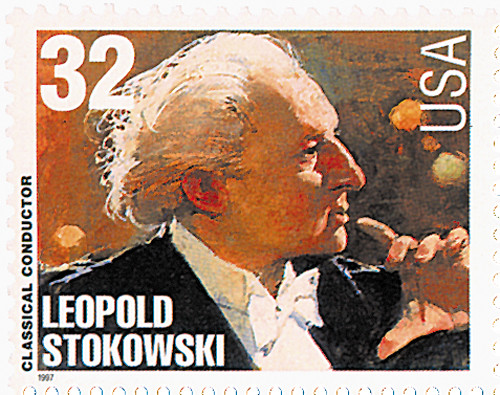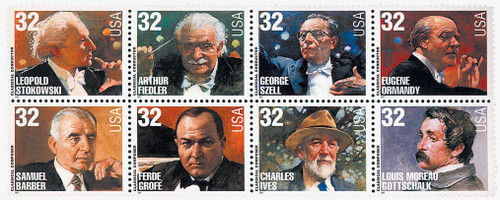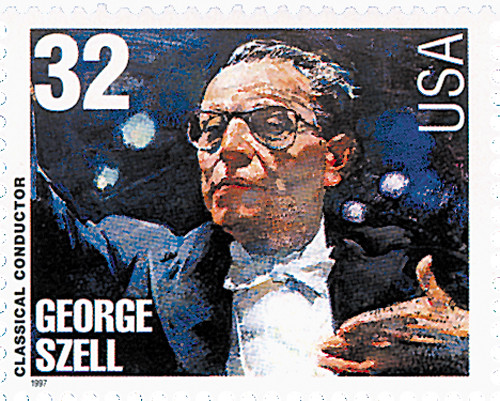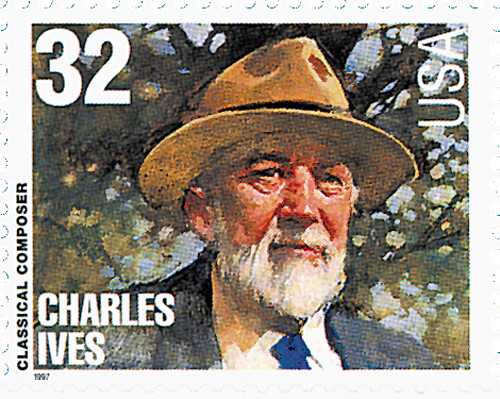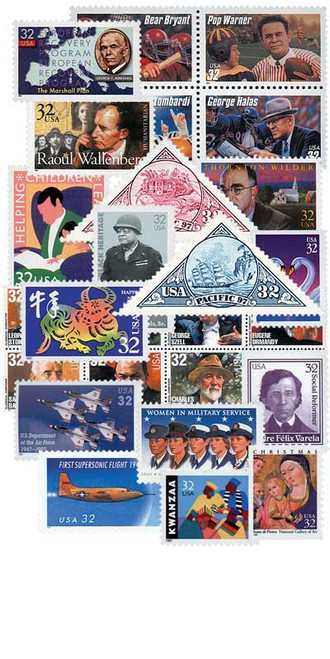
# 3159 - 1997 32c Conductors and Composers: Arthur Fiedler, Conductor
US #3159
1997 Arthur Fiedler – Classical Composers & Conductors
American Music Series
- Pictures conductor Arthur Fiedler
- Part of the Classical Composers & Conductors set
- The 10th stamp set in the Legends of American Music series
Stamp Category: Commemorative
Set: Classical Composers & Conductors
Series: Legends of American Music
Value: 32¢, First Class Mail Rate
First Day of Issue: September 12, 1997
First Day City: Cincinnati, Ohio
Quantity Issued: 86,000,000
Printed by: Printed for Ashton Potter (USA) Ltd. By Sterling Sommer of Tonawanda, New York
Printing Method: Offset
Format: Pane of 20 (Horizontal 4 across, 5 down)
Perforations: 11.1 by 11.0
Tagging: Phosphored paper
Why the stamp was issued: To commemorate conductor Arthur Fiedler, one of the best of the best in American classical music.
About the stamp design: The stamp pictures a painting of Fiedler by artist Burt Silverman (also responsible for the image on the 1997 Raoul Wallenberg stamp). Art director Howard Paine said he chose Silverman because “He is a mature portrait painter… I didn’t want some glitzy, commercial, airbrush, flashy, tightly rendered kind of art…. Burt’s work is ‘painterly.’ He works in oil, and you can see dabs of color and you see brush strokes and you see the human touch.”
First Day City: The First Day of Issue Ceremony for the Classical Composers & Conductors stamps was held in Cincinnati, Ohio, at the Classical Music Hall of Fame. The city is also home to the Cincinnati Symphony Orchestra, then the fifth oldest symphony orchestra in the United States. It is also home to the Cincinnati Opera, the country’s second-oldest opera company.
About the Classical Composers & Conductors set: Issued to commemorate composers Samuel Barber, Ferde Grofe, Charles Ives, and Louis Moreau Gottschalk, as well as conductors Leopold Stokowsky, Arthur Fiedler, George Szell, and Eugene Ormandy. They were chosen to represent the best of the best in American classical music.
About the Legends of American Music Series: The Legends of American Music Series debuted on January 8, 1993, and ran until September 21, 1999. More than 90 artists are represented from all styles of music: rock ‘n’ roll, rhythm and blues, country and western, jazz and pop, opera and classical, gospel and folk. In addition to individual singers and Broadway musicals, subjects include band leaders, classical composers, Hollywood songwriters and composers, conductors, lyricists, and more. The Legends of American Music Series was a huge advancement for diversity because it honored many Black and female artists.
History the stamp represents: Conductor Arthur Fiedler (1894-1979) began studying music early in life. His first teacher was his father, an Austrian-born violinist with the Boston Symphony Orchestra and Kneisel Quartet. As a boy, Fidler studied in Berlin, where he made his musical debut as a violinist at age 17. At the outbreak of World War I, he returned to the United States and joined the Boston Symphony Orchestra as a viola player.
In 1924, Fiedler joined 25 of his fellow players to form the Boston Sinfonietta, later known as the Arthur Fiedler Sinfonietta. In addition to creating greater musical diversity within the city, the ensemble also gave performances in the more remote areas of surrounding states. Starting in 1929, he organized the highly successful Esplanade Concerts in Boston, and a year later he was made conductor of the Boston Pops Orchestra – a position he held for more than 40 years.
Fiedler’s personality, showmanship, and expansion of the symphony’s repertoire (he often included show tunes and arrangements of popular songs) brought great commercial success – a success which extended to television, radio, and recording. Well-loved in the United States, he also earned a wonderful reputation abroad, which was bolstered by his frequent tours of Europe.
US #3159
1997 Arthur Fiedler – Classical Composers & Conductors
American Music Series
- Pictures conductor Arthur Fiedler
- Part of the Classical Composers & Conductors set
- The 10th stamp set in the Legends of American Music series
Stamp Category: Commemorative
Set: Classical Composers & Conductors
Series: Legends of American Music
Value: 32¢, First Class Mail Rate
First Day of Issue: September 12, 1997
First Day City: Cincinnati, Ohio
Quantity Issued: 86,000,000
Printed by: Printed for Ashton Potter (USA) Ltd. By Sterling Sommer of Tonawanda, New York
Printing Method: Offset
Format: Pane of 20 (Horizontal 4 across, 5 down)
Perforations: 11.1 by 11.0
Tagging: Phosphored paper
Why the stamp was issued: To commemorate conductor Arthur Fiedler, one of the best of the best in American classical music.
About the stamp design: The stamp pictures a painting of Fiedler by artist Burt Silverman (also responsible for the image on the 1997 Raoul Wallenberg stamp). Art director Howard Paine said he chose Silverman because “He is a mature portrait painter… I didn’t want some glitzy, commercial, airbrush, flashy, tightly rendered kind of art…. Burt’s work is ‘painterly.’ He works in oil, and you can see dabs of color and you see brush strokes and you see the human touch.”
First Day City: The First Day of Issue Ceremony for the Classical Composers & Conductors stamps was held in Cincinnati, Ohio, at the Classical Music Hall of Fame. The city is also home to the Cincinnati Symphony Orchestra, then the fifth oldest symphony orchestra in the United States. It is also home to the Cincinnati Opera, the country’s second-oldest opera company.
About the Classical Composers & Conductors set: Issued to commemorate composers Samuel Barber, Ferde Grofe, Charles Ives, and Louis Moreau Gottschalk, as well as conductors Leopold Stokowsky, Arthur Fiedler, George Szell, and Eugene Ormandy. They were chosen to represent the best of the best in American classical music.
About the Legends of American Music Series: The Legends of American Music Series debuted on January 8, 1993, and ran until September 21, 1999. More than 90 artists are represented from all styles of music: rock ‘n’ roll, rhythm and blues, country and western, jazz and pop, opera and classical, gospel and folk. In addition to individual singers and Broadway musicals, subjects include band leaders, classical composers, Hollywood songwriters and composers, conductors, lyricists, and more. The Legends of American Music Series was a huge advancement for diversity because it honored many Black and female artists.
History the stamp represents: Conductor Arthur Fiedler (1894-1979) began studying music early in life. His first teacher was his father, an Austrian-born violinist with the Boston Symphony Orchestra and Kneisel Quartet. As a boy, Fidler studied in Berlin, where he made his musical debut as a violinist at age 17. At the outbreak of World War I, he returned to the United States and joined the Boston Symphony Orchestra as a viola player.
In 1924, Fiedler joined 25 of his fellow players to form the Boston Sinfonietta, later known as the Arthur Fiedler Sinfonietta. In addition to creating greater musical diversity within the city, the ensemble also gave performances in the more remote areas of surrounding states. Starting in 1929, he organized the highly successful Esplanade Concerts in Boston, and a year later he was made conductor of the Boston Pops Orchestra – a position he held for more than 40 years.
Fiedler’s personality, showmanship, and expansion of the symphony’s repertoire (he often included show tunes and arrangements of popular songs) brought great commercial success – a success which extended to television, radio, and recording. Well-loved in the United States, he also earned a wonderful reputation abroad, which was bolstered by his frequent tours of Europe.







